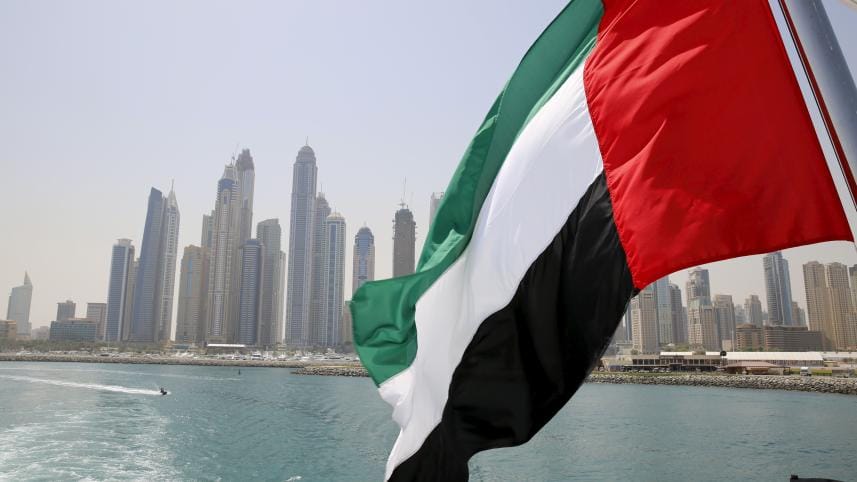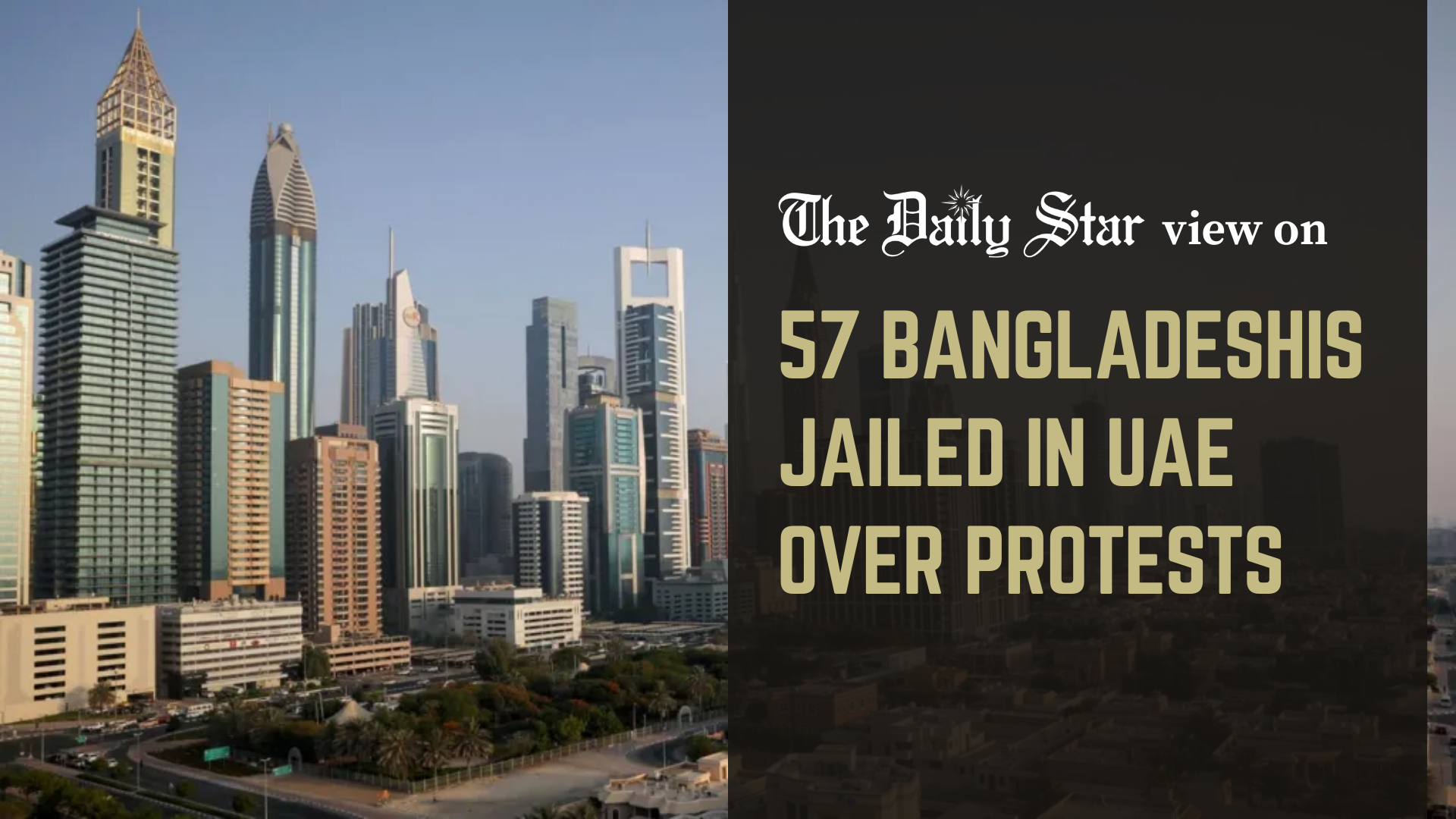Our migrant workers in UAE: Bound by borders, freed by conscience

Bangladeshi migrant workers dedicate all their labour to host countries, but their hearts seem to be rooted in their homeland. They became the unsung heroes of a mass movement that witnessed the downfall of the previous regime. With all the focus on students and the general public who came to their aid, we often overlook the courageous acts of diasporic nationalism by our overseas workers. Their decision to stop sending money through official routes caused a financial shockwave for the then government, causing a shortage of foreign currencies. They took part in a series of protests, both on the streets and in cyberspace, showing their loyalty to the people's fight for justice at home. For some, this came with a high personal cost.
The United Arab Emirates (UAE) sentenced 57 Bangladeshi migrant workers to 10 years to more of imprisonment (three were sentenced for life) for staging protests against the Awami League government. The oil-rich country, which hosts around 10 lakh Bangladeshis, also constricted the issuance of new employment visas. We saw similar protests in front of other Bangladeshi missions abroad. But the swift judgement by the UAE and the equally quick intervention by the interim government of Bangladesh is a moment worth reflecting upon from multiple angles: diplomatic, humanitarian, and human rights. The incident underscores the delicate balance between upholding the rule of law in host countries, the soft power of individual leaders, and the enduring vulnerability of migrant workers, who are the lifeblood of our economy.
Central to this issue is the conscience of migrant workers—individuals who, despite their distance from home, carry with them the sociopolitical struggles of their homeland. Their conscience-driven participation in the protests and loyalty towards their country violated the UAE's strict laws prohibiting public protests, particularly by non-citizens. They faced detention, an expedited trial, and prison sentences as a result. The former prime minister cited the sentencing order to vindicate her government's position, but they made little to no effort to aid our citizens abroad.
Soon after the interim government assumed power, it appointed a legal adviser to assist the detainees. Chief Adviser Dr Mohammad Yunus raised the issue and requested clemency for the jailed workers when UAE President Sheikh Mohamed bin Zayed Al Nahyan phoned him on August 28. A general pardon was granted less than a week later. From a diplomatic perspective, the release of workers represents an early win for the interim government. The positive response to this appeal demonstrates the strength of Bangladesh-UAE relations and the persuasive power of diplomatic negotiations. The UAE's goodwill towards Bangladesh goes beyond mere economics—it reflects an acknowledgement of the contribution these workers have made to the development of the UAE itself, a country that is home to 90 percent non-Emiratis.
The humanitarian intervention elevates the status of migrant workers from mere economic agents and demonstrates the empathetic sides of both governments. However, the incident underscores the necessity of educating our workers about the legal frameworks and political rights of their host countries. Any ignorance leaves them vulnerable to arbitrary detention and harsh legal consequences. The commendable diplomatic engagement of the interim government of Bangladesh in securing the release of jailed workers also highlights the fundamental need for safeguarding our migrant workers from unjust punishment for their acts of conscience.
The negotiation, quite possibly, got through because of the individual influence of Bangladesh's Nobel laureate. The Washington Post recently speculated that Dr Yunus's soft power may have indirectly influenced the UAE's decision to grant clemency. The UAE, mindful of its international reputation and relationships with key global figures like Dr Yunus, may have found itself inclined to show mercy, particularly given the international outcry from human rights organisations like Human Rights Watch over the harsh sentences. Dr Yunus represents the kind of moral leadership that transcends borders and governmental affiliations. Years of advocating for the poor and marginalised have built his personal diplomacy, making him a figure of influence that the UAE could not ignore. This has come as sheer joy for all Bangladeshis. So much so that one Gen Z member commented on Instagram, "Dr Yunus is cooking!"
The UAE, like many Gulf nations, faces persistent criticism over its human rights record, particularly in relation to migrant labour. The controversial kafala system, which binds migrant workers to their employers and limits their freedom, is often considered a form of modern-day slavery. International observers saw Bangladeshi workers' sentences for peaceful protests as an example of the repressive laws governing public dissent in the UAE. However, the UAE president's decision to intervene reflects a balancing act between enforcing the rule of law and demonstrating a humanitarian impulse. We should view the president's clemency within the broader context of the UAE's efforts to manage its global reputation while maintaining internal security. He upheld the law in this case, punishing the workers for breaking it, while simultaneously demonstrating mercy, a key value in religious and Gulf leadership traditions. This can be a learning dashboard for our foreign, labour, and expatriate welfare ministries. We need to learn to negotiate not only from a position of strength, but also with cultural and political sensitivity.
The media coverage of this event captures the diplomatic nuance. An editorial in this newspaper framed the pardon as a diplomatic success, focusing on the economic implications. The narrative of diasporic nationalism took precedence over a critical examination of the workers' rights violations. The international press, particularly outlets like Al Jazeera and The Washington Post, focused more on the human rights dimension—highlighting the excessive nature of the sentences, the arbitrary detention of peaceful protesters, and the systemic oppression faced by migrant labourers in the Gulf. This divergence in reporting reflects a broader tension between national economic interests and the universal advocacy for human rights. While local media may be inclined to present such events in a manner that maintains favourable diplomatic relations, international outlets often take a more critical stance, examining the implications of these events for global human rights norms.
As Bangladesh looks to the future, it must recognise the vulnerability of its migrant workforce. While diplomatic victories like this are important, they do not address the systemic issues that lead to such incidents in the first place. We must tackle the ignorance of legal rights, the repressive labour conditions under the kafala system, and the lack of effective protections for migrant workers head-on. Civil society organisations and the government must work together to educate workers heading to the Gulf about their rights and responsibilities in their host countries. They must also advocate for labour rights reforms in these countries to protect workers from exploitation and arbitrary detention. Respecting migrant workers' conscience necessitates legal awareness that enables them to navigate the complex realities of life in countries such as the UAE. Only then can Bangladesh truly ensure the safety and dignity of its diaspora, not just as economic contributors but as human beings deserving of rights and protections both at home and abroad.
Dr Shamsad Mortuza is professor of English at Dhaka University.
Views expressed in this article are the authors' own.
Follow The Daily Star Opinion on Facebook for the latest opinions, commentaries and analyses by experts and professionals. To contribute your article or letter to The Daily Star Opinion, see our guidelines for submission.




 For all latest news, follow The Daily Star's Google News channel.
For all latest news, follow The Daily Star's Google News channel. 

Comments